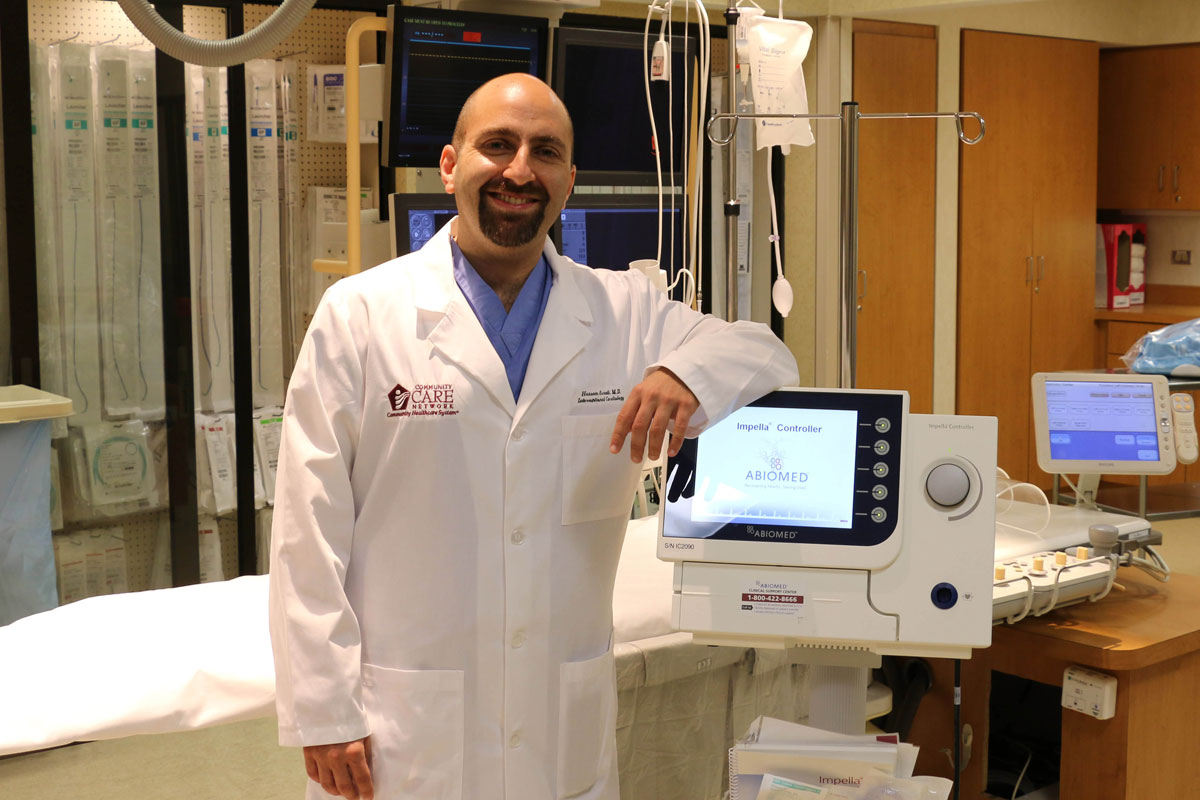A minimally invasive procedure is providing new hope for patients with heart valve disease in Northwest Indiana. Interventional cardiologist Hussam Suradi, MD, FACC, FSCAI, on staff at St. Mary Medical Center in Hobart, and Community Hospital in Munster, recently performed a balloon valvuloplasty assisted by an Impella heart pump at St. Mary Medical Center -- the first time this type of assist has been performed in the state of Indiana.
“The use of the Impella pump offered new hope for this patient, whose heart was so weak, it may not have withstood the strain of undergoing a normal valvuloplasty,” said Suradi. “Now, her heart has a chance to recover so that a valve replacement can be an option in the future. This opens a new treatment avenue for patients with severe stenosis who are too ill to undergo a valve replacement. It is especially meaningful for aging patients who are often told there is nothing else that can be done.”
Many patients with aortic valves that have stiffened and narrowed, known as aortic stenosis, are candidates for valve replacement surgery, including a minimally-invasive procedure called transcatheter aortic valve replacement (TAVR).
“TAVR utilizes a catheter to replace the valve, appropriate for those patients who are considered high risk for a standard valve replacement surgery,” said Suradi. “After more tests, it was clear that even the minimal stress from TAVR was too great for this patient’s heart to handle. The heart needed to strengthen to allow valve replacement to be an option in the future.”
To clear the stenosis, Suradi performed a balloon valvuloplasty. During this procedure, a catheter with a balloon at the tip is placed in the groin through the aorta into the heart. The balloon then inflates once inside the valve, opening the stiffened, narrow leaflets of the valve allowing blood to flow more freely. The increased blood flow eases strain on the heart caused by the stenosis and allows it to strengthen.
But because of this patient’s extremely low blood pressure, it was feared that even the balloon valvuloplasty could cause a cardiac arrest during the procedure, when blood flow is temporarily blocked as the balloon inflates. To aid the heart function, Suradi used an Impella heart pump to act as a bypass machine, pulling blood from the left ventricle, against the aortic valve and back into the rest of the body. The pump was inserted through a catheter in the other side of the groin, to reach the heart, where it took over pumping the blood until the valvuloplasty was complete.
“The procedure was a complete success,” said Suradi. “The patient’s heart function immediately improved and she returned home within 48 hours. Now we just need to give her heart time to strengthen enough to determine if a TAVR procedure can be performed for a more permanent solution.”
Suradi is the only fellowship-trained structural cardiologist in Northwest Indiana. He is the medical director of the Structural Heart & Valve Center at St. Mary Medical Center in Hobart and Community Hospital in Munster which specializes in minimally invasive treatments of all types of valve disease and other disorders that affect blood flow through the heart.
“We are utilizing advanced technologies and procedures at the hospitals of Community Healthcare System, to help ailing, older patients whose only other options for treatment were to travel to academic medical centers outside the area,” said Suradi. “We are now offering that level of expertise and resources to patients closer to home.”
The Structural Heart & Valve Center team of Community Healthcare System is dedicated to providing patients with access to the most advanced treatments for structural heart and valve diseases. This center is led by Hussam Suradi, MD, FACC, FSCAI, who is Northwest Indiana’s only fellowship-trained Congenital and Structural Interventional Cardiologist. With this expertise, the Structural Heart & Valve Center is among an elite few in Indiana to offer patients Mitraclip for mitral valve repair, Watchman for stroke prevention in atrial fibrillation, balloon valvuloplasty for both aortic and mitral valve stenosis and transcatheter aortic valve replacement (TAVR). Using a multidisciplinary approach, the team discusses the most effective treatment options and shares best practices to ensure that patients receive the most comprehensive care available.
To learn more about the center, call 219-703-5301 or visit comhs.org.

